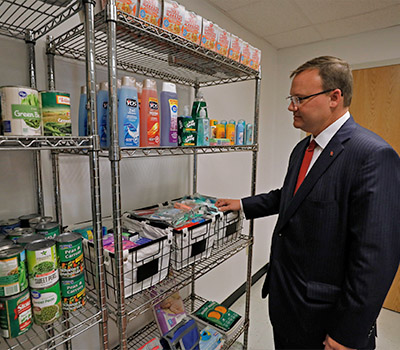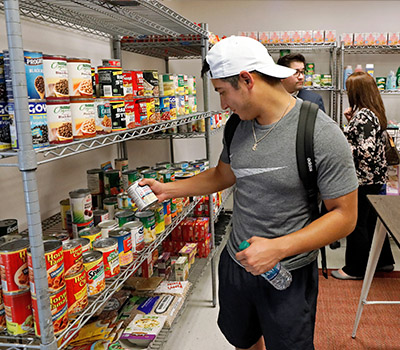Service is Transformational
By Thomas M. Evans, PhD
While more than 5,000 miles separate San Antonio and Paris, France, the students and staff who have come to rely on the Cardinals’ Cupboard Food Pantry inside Joeris Hall might find a bridge in this story that erases that gap.
 Like many colleges across the country, UIW saw a new level of need across our extended faith community as the COVID-19 pandemic deepened and people faced a sudden loss of work and wages. Basic resources such as housing, health care and food could no longer be taken for granted. Thankfully, UIW teams from Mission and Ministry and the Ettling Center for Civic Leadership and Sustainability had already joined with long-time partner, the Society of St. Vincent de Paul, to establish the food pantry.
Like many colleges across the country, UIW saw a new level of need across our extended faith community as the COVID-19 pandemic deepened and people faced a sudden loss of work and wages. Basic resources such as housing, health care and food could no longer be taken for granted. Thankfully, UIW teams from Mission and Ministry and the Ettling Center for Civic Leadership and Sustainability had already joined with long-time partner, the Society of St. Vincent de Paul, to establish the food pantry.
Like UIW, the Society of St. Vincent de Paul has traces its origins to young people responding to a call during a time of crisis. It was a group of seven Catholic college students who began the Society of St. Vincent de Paul in Paris, France, in 1833 in the midst of a cholera epidemic, housing shortages and extreme overcrowding. It so happens that San Antonio and South Texas also experienced a cholera epidemic in 1833 — one of many that would eventually connect Claude Dubuis, Bishop of Galveston, with the the Order of the Incarnate Word and Blessed Sacrament in Lyons, France.
The Society of St. Vincent de Paul’s founder, Frédéric Ozanam, had been challenged during a debate to demonstrate what he and his fellow Catholic students were personally doing to help the poor.
Then 20-year-old Ozanam sprung to action and with his six peers visited the poor in their homes, providing them with needed aid and assistance. Ozanam soon placed the work under the patronage of St. Vincent de Paul who had spent his life in 16th century France serving the poor. Within a few years, the original group of seven grew to 600, spreading to 15 other cities and towns in France, numbering more than 2,000 members
 “The story of our founding captivates college students,” says Valerie Finley, executive director of the Society of St. Vincent de Paul Southwest Texas Council. “I’m always looking for ways to involve more college students. It’s a natural fit.”
“The story of our founding captivates college students,” says Valerie Finley, executive director of the Society of St. Vincent de Paul Southwest Texas Council. “I’m always looking for ways to involve more college students. It’s a natural fit.”
A good example is Gabriella Martinez, a Community Health Education ’20 graduate, who spent two semesters of service learning working alongside Finley and her team. “While doing my internship with St. Vincent de Paul, I learned how to interact and build relations with people experiencing homelessness,” Martinez said. “I learned that advocating for the clients who were in dire need was something I didn’t have to think twice about doing.”
Executive Director Finley explains that as a small non-profit, well-rehearsed intern professional development is a priority. Finley said: “Watching someone like Gabriella gain confidence and refine her skills was amazing.”
Martinez, in turn, credits Finley and Family and Community Assistance Manager Devon Maddox with bringing her on board just as the pandemic hit San Antonio’s neediest populations. “I learned to contact clients so I can assist them just as COVID became a crisis. After the great experience I had interning under Devon and Valerie, I decided to continue the same work with The Center for Health Care Services in San Antonio.”
Asked how staff and interns alike working on the front lines of service — meeting need for everything from food and rental assistance to vaccination scheduling — can sustain themselves, Finley said: “I start with faith. Jesus asked us to serve the needy. We take care of people.”
Sr. Walter Maher, CCVI, vice president for Mission & Ministry at UIW agrees. “We have a wonderful working relationship with the Society of St. Vincent de Paul. As a campus community, we provide service and help, but during the pandemic, the needs of our students and our families also became clear. We had to recognize that we can’t take care of everything, but if we collaborate with the larger community, everyone benefits.”

